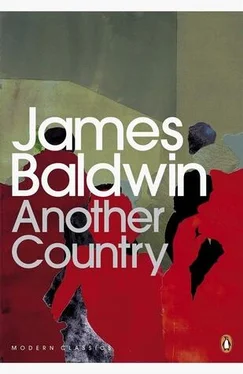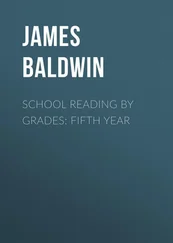“And you think he doesn’t love you any more?”
She did not answer. She covered her forehead with her ringed left hand and stared into the dish of salted peanuts as though the answer to all riddles were hidden there. The tiny arrows on her wrist watch said it was twenty-five minutes to seven. Ida would have left Ellis hours ago and would have visited her singing teacher. She would now be in the restaurant, her station set up, and her uniform on, preparing for the dinner rush. He could see her closed, haughty face as she approached a table, manipulating her pad and pencil as though it were a sword and shield. She would not have stayed long with Ellis — he was a busy man. But how long did it take for those guys to bang off a quick one, in the middle of the afternoon, in their inviolable offices? He tried to concentrate on Cass and her trouble. Perhaps he had taken her out for a drink; perhaps he had persuaded her not to go to work, and had invited her for dinner; perhaps they were together now. (Where?) Perhaps Ellis had persuaded her to meet him at midnight in a theatrical bar, the kind of place where it would do her good to be seen with him. But no, not that; it would certainly not do Ellis any good to be seen with her . Ellis was far too smart for that — just as he was far too smart to make any verbal comparisons between his power and Vivaldo’s. But he would lose no opportunity to force Ida to make these comparisons for herself.
He was making himself sick with his fears and his fantasies. If Ida loved him, then Ellis and the whole great glittering world did not matter. If she did not love him, there was nothing he could do about it and the sooner everything came to an end between them, the better. But he knew that it was not as simple as that, that he was not being honest. She might very well love him and yet — he shuddered and threw down his drink — be groaning on some leather couch under the weight of Ellis. Her love for him would in no way blunt the force of her determination to become a singer — to pursue the career which now seemed so easily within her grasp. He could even see the truth of her loving and vehement assertion that it was he, his love, which had given her the courage to begin. This did not cheer him, the assertion containing to his ears the suggestion that his role now was finished and he was fouling up everything by failing to deliver his exit lines. He shook his head. In half an hour — no, an hour — he would call the restaurant.
“Oh, Cass,” he heard himself saying, “I wish I could do something to help.”
She smiled and touched his hand. The tiny arrows on her wrist had not moved. “Thank you,” she said — very gravely. Then, “I don’t know if Richard loves me any more or not. He doesn’t see me any more — he doesn’t see me. He hasn’t touched me”—she raised her eyes to Vivaldo’s and two tears spilled over and rolled down her face; she made no move to check them—“he hasn’t touched me in, oh, I don’t know how long. I’ve never been very aggressive; I’ve never had to be.” She struck at her tears with the back of her hand. “I sit in that house like — like a housekeeper. I take care of the kids and make meals and scrub toilet bowls and answer the phone and he just — doesn’t see me. He’s always working . He’s always busy with deals with — with Ellis, I guess, and his agent and all those horrible people. Maybe he’s mad at me because I don’t like them very much and I can’t help it.” She caught her breath, found another wad of Kleenex, and again accomplished miracles with it. “In the beginning, I sort of teased him about them. I don’t any more, but I guess it’s too late. I know they’re busy and important but I can’t help it, I don’t think it’s serious work . Maybe Richard’s right, he says I’m a New England snob and a man-killer but God knows I don’t mean to be and — I don’t think Richard’s work is any good any more and he can’t forgive me for that . What am I to do?” And she put both hands to her forehead, looking down, and began to cry again. He looked cautiously around the dark lounge. No one was noticing them. It was suddenly a quarter to seven.
Ineptly, he asked, “Have you and Richard talked about this at all?”
She shook her head. “No. We’ve just had fights. We don’t seem to be able to talk to each other any more. I know that people say that there comes a time in marriage when everything goes out of it except companionship, but this can’t be what they were talking about, not this, not so soon. I won’t have it!” And now the extraordinary violence in her voice did cause a few heads to turn in their direction.
He took both her hands, smiling. “Easy, girl, easy. Let me buy you another drink.”
“That would be nice.” The drink before her was mainly water, but she finished it. Vivaldo signaled the waiter for another round.
“Does Richard know where you are now?”
“No — yes. I told him I was going to have a drink with you.”
“What time does he expect you back?”
She hesitated. “I don’t know. I left supper in the oven. I told him if I wasn’t back in time for supper to feed the children and eat himself. He just grunted and walked into his study.” She lit a cigarette, looking both desperate and distant; and he knew that there was more in her mind than she was telling. “I guess I’ll go on back, though. Or maybe I’ll go to a movie.”
“Would you like to have supper with me?”
“No. I don’t feel like eating. Besides”—the waiter came with their drinks; she waited until he left—“Richard’s a little jealous of you.”
“Of me ? Why is he jealous of me ?”
“Because you may become a real writer. And now he never will be. And he knows it. And that’s the whole trouble.” She made this pronouncement with the utmost coolness and Vivaldo began to see, for the first time, how deadly it must he for Richard, now, to deal with a woman like Cass. “Goddamnit. I wouldn’t care if he couldn’t read .” And she grinned and took a swallow of her drink.
“Yes, you would,” he said. “You can’t help it.”
“Well. If he couldn’t read, and knew it, he could learn. I could teach him. But I don’t care if he’s a writer or not. He’s the one who dreamed all that up.” She paused, bony and thoughtful. “He’s a carpenter’s son,” she said, “the fifth son of a carpenter who came from Poland. Maybe that’s why it’s so important. A hundred years ago he’d have been like his father and opened a carpenter’s shop. But now he’s got to be a writer and help Steve Ellis sell convictions and soap.” Ferociously, she ground out her cigarette. “And neither he, nor anyone else in that gang, can tell the difference between them.” She lit another cigarette at once. “Don’t misunderstand me; I’ve got nothing against Ellis, or any of those people. They’re just ordinary Americans, trying to get ahead. So is Richard, I guess.”
“And so is Ida,” he said.
“Ida?”
“I think she’s been seeing him. I know she had a date to see Ellis this afternoon. He’s promised to help her — with her career.” And he smiled, bleakly.
Suddenly, she laughed. “My God. Aren’t we a wonderful pair of slobs. Sitting here in this dark place, full of self-pity and alcohol, while our lovers are out there in the real world, seeing real people, doing real things, bringing real bacon into real homes — are they real? are they? Sometimes I wake up at night with that question in my mind and I walk around the house and go and look at the children. I don’t want them to be like that . I don’t want them to be like me, either.” She turned her face sideways, looking helplessly at the wall. With her golden hair down, and all the trouble in her face, she looked unbelievably young. “What am I to do?”
Читать дальше












